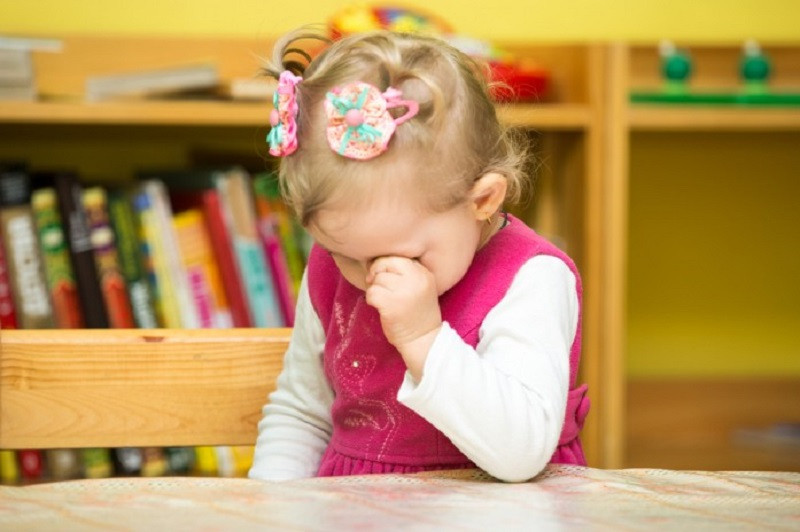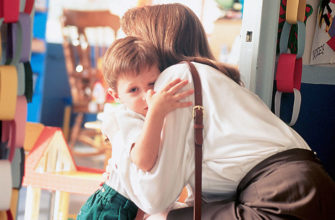Our family began to prepare for kindergarten when our daughter was two years old. We attended a preparatory group where the daughter enjoyed spending several hours a day. The situation changed dramatically for the worse when a long-awaited ticket to the garden for a full day was received.

First difficulties
During a visit to the preparatory group, the daughter learned how to wash her hands, go to the toilet, tried to dress herself, ate with appetite, enjoyed talking with other children and chatted great for her age.
The preparatory group psychologist assured us that we are ready to attend a full day kindergarten. The first days in the new kindergarten went well - the daughter had a normal mood, good appetite, interest in new games and chatting with other children. But, this was until the time when we took the child in half a day, until the afternoon sleep.
We decided to leave for a full day and immediately problems began:
- every day morning tantrums, tears, moods;
- constant requests to stay home, heavy parting;
- difficulty eating and sleeping.
My daughter began to write, although from the age of one and a half she began to use a pot instead of diapers - and this is the first reaction to a stressful situation, a psychologist told us, to which we came to an appointment a week later visiting a new kindergarten.
There was increased anxiety and even some timidity, the baby was afraid to be alone, mom, grandmother, and dad should always be nearby.
Naturally, my husband and I immediately talked with the kindergarten teachers, but they assured that this is normal adaptation to new conditions and lasts, such behavior can take a long time, depending on the nature of the child - a maximum of two months.
We did not want to injure the child, so we again reduced the daughter’s stay in the group to 4 hours a day. We were surprised that in the first month of visiting the kindergarten, teachers canceled walks in the fresh air, the guys were constantly in the room. This was explained by the fact that the adaptation of the kids is easier and faster, they quickly get used to the new environment.
A month passed, but my daughter did not stop acting up and refused to go to kindergarten categorically.
Main problem
Since the situation did not change, my husband and I decided to talk with other parents without carers. A bleak picture emerged and the problem was not at all adaptation and getting used to:
- “To make it easier for children to adapt,” teachers canceled walks and any classes for the entire first month of visiting the kindergarten.They assured their parents that the children begin to cry when the situation changes, they must first get used to the group;
- only a limited number of developmental classes were conducted for an hour or two: standard boring physical education, drawing, music once a week, and that’s all;
- the kids had no leisure - no modeling, no drawing, no organized games. Children were left to their own devices.
As a result of this adaptation, the daughter formed a firm idea that there was nothing to do in the garden - “hooligans are not interesting there” (naturally, children who were not busy with anything smashed everything around).
So three months passed. Yes, morning walks, music lessons and physical education, creativity once a week now appeared in the group. But my child was never able to get used to the new situation, tantrums continued, the garden became a torment and a test for our whole family. It was clear that the issue was not adaptation. But then what?
One evening, the parental chat broke, and everything that I felt intuitively was confirmed: the teachers shout at the children, in the evening they do not turn on the lights and negatively set the kids to cry, and the parents took them home early (the teacher’s working day ended right after the parents took the last child), the children were shown cartoons on the smartphone (and the older groups of this Moscow kindergarten had TVs at all), with the kids they said unacceptable things to your parents: “Your child hates kindergarten, and you want to leave it until dinner ”... About that, in order to interest children, to engage in the game, read a book or tell something about the world around, there was no question at all.
After unsuccessful attempts to change the situation, we decided to transfer the child to another preschool institution. Fortunately, this was done in the middle of the school year. This time we were very lucky with the educators - they are motivated, engaged in kids, come up with thematic weeks for creativity, created a very comfortable atmosphere in the group. My child, whose life passed stress, immediately made a leap in development.
But, the negative experience did not allow her daughter to immediately change her attitude to kindergarten. It took four months before she agreed to stay for a full day and began to increasingly share interesting impressions and events that happened to her in the kindergarten.
We still have a lot of work to do for our daughter to forget the negative experience of the first kindergarten. The psychologist advised me to watch recordings of matinees more often, discuss new friends and games in the group, and watch drawings and crafts together.
Simple rules will help to avoid negative experiences and protect the child from negativity in kindergarten:
- first take an interest in what parents say about this children's institution in social networks, how they speak about teachers and the director;
- you can talk with parents who are already visiting this kindergarten, just meeting them at the gate when they pick up the children;
- You must talk with the teacher - find out what methods he uses, what the child wants to teach. The first impression, which is rarely deceiving, is extremely important. If the teacher did not like it, then it is better to look for a new kindergarten and not risk the psyche of the child;
- do not ignore the first negative emotions and the mental state of the baby - the child cannot adapt to the nervous situation of indifference, and stress negatively affects the normal development of the baby;
- communicate with parents, attend meetings, participate in the life of a kindergarten, to be always up to date and to identify possible problems in time.
You can come to pick up the baby early, in about an hour, when the teacher is sure that there is still a lot of time before the parents arrive. Believe me, you can see and learn a lot of interesting things.
Sometimes it’s not superfluous to listen to what is happening in a group behind a closed door.If the teacher is polite and nice with you, and the child does not want to go to kindergarten, you need to understand the reasons and defend the interests of the baby. There is no one to protect him except you.
We also read: The child does not want to go to kindergarten - what to do








